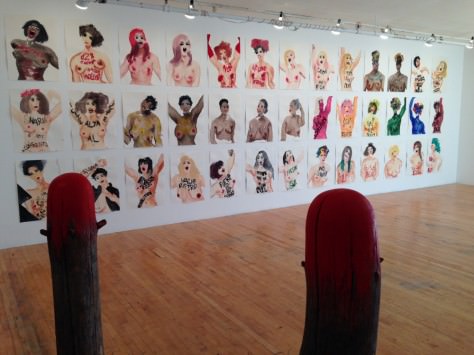Nadine Faraj
The Whole World Has Gone Joyously Mad
Opening: 2016-06-08
Composed of watercolors and sculptures, The Whole World Has Gone Joyously Mad is an installation by Nadine Faraj, inspired by female activists who use their nudity as a means to protest. According to the artist, this is a way for these women to draw attention to the cause they are fighting for. However it also makes them more vulnerable to the possible reactions of the public, often already hostile to their presence and their tactics.
In May 2012, some Montreal students protested, almost completely nude, against rising tuition fees proposed by the government. Protesting nude was, for them, the ideal way to demand in return an equal transparency from political leaders.
Faraj’s Installation The Whole World Has Gone Joyously Mad includes portraits of some of the students present during this activist movement in 2012, and those of female activists from all over the world.
The blurred appearance of Nadine Faraj’s artworks is the result of a specific treatment of the pigment, obtained by controlling the moisture content of the paper. It results in a universe composed of slightly distorted and potentially disturbing images, always reflective of our own fragility.
A series of sculptures are presented in parallel with the artist’s watercolors: the tree trunks, because of their vertical posture, are reminiscent of the protestors and are symbolic of the phallic organ. According to Faraj, the tree trunks complement the portraits of the female protestors, by creating harmony between the artworks.
Press releaseNews
No news at the moment.




